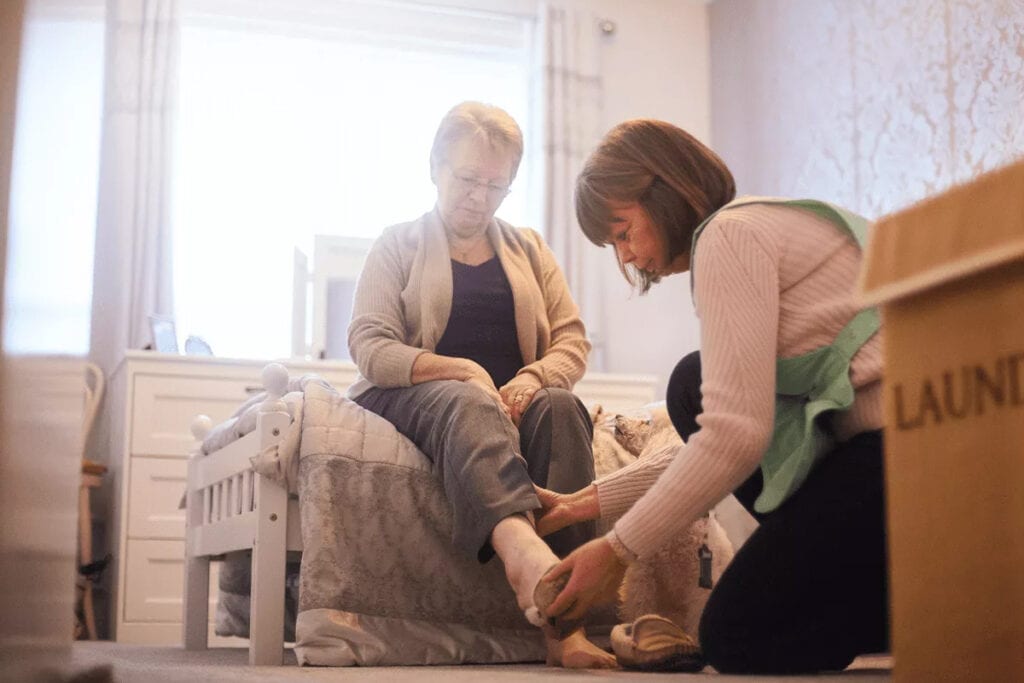Making the correct choice between different living options can be a cause for major stress. When the time arrives to reckon with the choice of delegating the care of an elderly loved one to a nursing facility or assisted living, it is crucial to be adequately prepared. You’ll be looking for the best possible alternative to ease the transition for relatives, but at times even figuring out what kind of facility would best suit their needs is a struggle.
Depending on the specific needs of the individual, it might be necessary to get specialized care for some health conditions, such as
dementia. So you will want to make sure that the staff at a particular facility are sufficiently trained to properly look after them, or that the appropriate amenities are available to cater to any special needs your family may have.
One of the most common categories of senior care options is memory care. In your search, you will also come across the assisted living. The two seem similar at first, but you need to know the situations that are appropriate for each, and the things to consider when choosing between them. Cost is an obvious one, and will probably be the first to jump out at you. But understanding the differences in service levels is crucial to the well-being of your loved one.
Is Assisted Living Similar To Memory Care?
The services both offer are comparable. They accommodate, feed, and help their clients with normal day-to-day tasks such as using the bathroom or taking medicine. These should all come standard in both types of care. In fact, apart from typical activities of daily living (ADLs), assisted living caters for residents coping with various types of dementia, provided that the condition is not severe and the support needed by the individual is not intensive.
Memory Care, on the other hand, is specially set up to cater for seniors with memory-related conditions. Such residents normally require closer attention and to help them with memory loss, their program must be designed at a personal level. Staff in these homes will have received special training to be able to properly nurse and take care of skilled nursing for people with memory loss.
Safety Level
Both facilities normally have procedures and standards in place to facilitate care for people well-advanced in age. This care might take different forms. It could be through staff looking in on residents at regular intervals during the day, or using specialized equipment to monitor them, and automatic warning systems for emergencies.
However, this is taken up a notch when it comes to homes with care for dementia. The environment is more controlled and there isn’t as much freedom. This is because people dealing with memory loss need closer monitoring so that they don’t wander, become agitated and aggressive, or somehow injure themselves.
So beyond the standard security and safety measures, homes with care for dementia additionally might implement additional restrictions such as having staff supervise residents round the clock, or implementing additional structural and infrastructure-related measures to enhance the protection of residents. For example, a facility might be set up to reduce the incidence of accidents by making sure all areas are well-lit or planning the facility such that patients are unlikely to get lost, or even using wearable technology to monitor patients. Memory care units are also specially designed to create an environment tailored to keeping residents relaxed.
Special Recreational Activities
In order to provide the requisite care for the elderly, facilities to make sure their residents are sufficiently occupied are common to both. This is crucial to their mental and physical well-being. This could be achieved through playing games, completing exercise sessions, forming clubs around common interests like books, and other such activities.
Specially Trained Staff
Both have employees who are trained caregivers equipped with the knowledge to provide adequate senior care. However, in homes with care for memory loss conditions, the workers additionally have the skills and they know the best practices for helping people with various types of dementia. Apart from being able to look after patients who may become aggressive or wander, the number of staff compared to residents is usually significantly higher. This is to enable the staff to provide personalized attention.
Specialized services
You will find that different homes will offer different services with varying facilities to support those activities. The idea is to make sure that residents stay active all the time, to keep them occupied, and make sure their physical and mental states are in as healthy a state as possible. Homes will therefore encourage their residents to play games, read literature if they find it interesting, or participate in gym or fitness sessions. To help their self-image, there might be services like spas, or beauty parlours. For men, there may be barbers or hairdressers.
Nursing homes with care for dementia offer similar amenities but overall, the setup will be intended to support residents with dementia-related difficulties. There will be stress-reducing areas to relax residents and relieve stress. Features with personal significance to residents might also be installed to provide residents with some familiarity and thus reduce anxiety.
In addition, there will be programs that focus on mental exercise. Residents will be encouraged to maintain or improve mental sharpness without stressing them. So the facility will try to create and maintain a serene and relaxing atmosphere for them.
The programs are not applied across the board. They are adapted to each individual, the staff try to find solutions that are relevant to each resident personally. For example, Reminiscence Therapy (RT), which is also called life review therapy. Here, staff try to help people jog their memory using objects that might hold some meaning, or provide a trigger to help residents evoke certain memories. These stimuli need not be objects. Staff might use smells, sounds, or whatever might help in a particular individual’s case.
Cost
How much you are asked to pay will vary depending on several factors: where the facility is, their infrastructure and what they are able to provide. Given that memory care provides more specialized services, those nursing homes tend to ask for more. This could be by as much as 30 percent more.
Reports by organizations active in this field put the average cost of assisted living in the US in 2020 at around $4,300 per month, or $51,600 a year. This includes living quarters, related amenities, and care. By some estimates, the figure rises to around $5,375 per month for memory care.
Making The Choice: Assisted Living Or Memory Care
At the end of the day, the choice of living option comes down to individual needs. Keep in mind that in making the choice between assisted living and memory care, you may initially opt for the former and, overtime, require the benefits of the latter as well.
Should You Choose Assisted Living?
If the individual is fairly independent and only needs assistance with activities of daily living (ADLs), this might be the solution for you. A typical assisted living facility should at least provide a maintained apartment, an activity program for seniors, and from one up to three meals daily.
If you anticipate that your relative will eventually require memory care, you have to take into account the stress they will have to go through by moving from one nursing home to another. It might be worth considering having them settle into a facility from the outset.
Is Memory Care The Option For You?
Such facilities cater for those suffering from some form of dementia, like Alzheimer’s disease. So if your relative requires this kind of care, or you expect that they will, you will be better off picking this solution. You get the assurance that care is being provided by staff who have the requisite training for special conditions. You also feel safer knowing such facilities implement tighter control to avoid incidents and ensure the residents’ safety. They are thus more restrictive.
Homes that cater for dementia-related conditions have measures in place and staff skilled enough to assist in such situations to reduce anxiety and ensure the safety of residents. To enable better service, they hire more employees. This way the staff are able to work with residents individually and adapt the programs to them.




